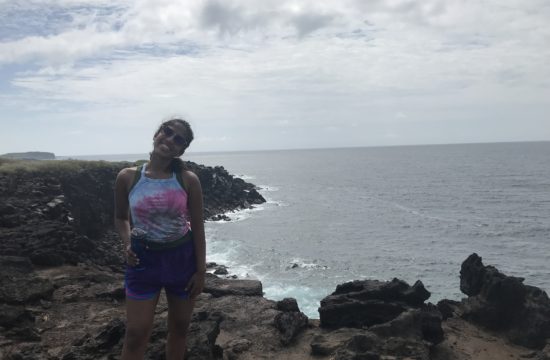Shane:
What kinds of work are you doing for the Iowa Environmental Council and what interests you about the work?
Sonita:
Iowa is in a really unique spot geographically because wind turbines are really compatible with Iowa’s landscape and Iowa can generate a lot of wind energy that could not only be used in Iowa, but in surrounding states, which can be really great.
My work is currently focused in Des Moines to help them implement their 24/7 carbon free electricity by 2035 resolution through different policies, incentives, and actions the city can take to ensure this goal is met.
I’ve also really been interested in environmental policy and that’s also part of the Iowa environmental sector. That’s not specifically what I do, but I get to work with people who do that work and hear what they’re doing and see that process myself.
As I’ve been studying it more, I think [environmental policy] is also really important. I’ve always been interested in science and preserving the planet. But seeing how different policies are being implemented is something that I’ve learned a lot about. I am also seeing how powerful policies can be, and also how the current policies we have are very outdated. I have also gotten the opportunity to learn a lot about who the current policies are helping and who they aren’t.
Shane:
As you think about the work you’re doing, are there any points where you think back to your time at Friends School and how that time may have a connection to some of your present work? Do you see any glimmers or sparks that maybe helped push you in that direction from when you were here?
Sonita:
Yeah, I would say definitely.
When I was nine and in the Bayou, we did a research project and I remember researching blue whales and becoming very focused very quickly on how to help preserve and save them. That was my identity for a really long time, you know? I mean, I’m even wearing whale socks right now [Laughs]. I am still very interested in whales, even leading up to my sophomore year of college, I wanted to be the person who was out saving the whales, getting rid of poachers. Then that year I was introduced to environmental justice and I realized how big and how intersectional the environmental movement is. Protecting our planet (and the whales that inhabit it) is still a big interest of mine and that project really anchored the next ten years of my life. I also feel that at Friends School, we spent a lot of time reflecting on our relationship to nature and land. I think that’s something I’ve always kept with me.
Shane:
That’s awesome. So reflecting back now on your position today, as an environmental educator, advocate, and activist, as well as someone interested in policy analysis and sustainability issues, what do you think a K-8 school should be centering in its teaching about the environment? How do you think schools should be teaching kids about these issues at those ages? What should those experiences look like to help prepare them for the kind of work you are doing now or would help you be able to do your work in the future?
Sonita:
I think what’s really important, and this is speaking mostly from what I did, is getting kids outside. But really getting kids outside in a way where they want to get back outside again. In a way, where you are asking, what interests you?
Children are still figuring out what they like. There are some students who would rather do other activities than read a book. But then there are other kids who are like, oh wait, can you tell me why the water looks like that? Knowing that the climate is going to look different and be different for them, it’s really important to help get kids outside in a way that they care about it and want to preserve it.
At Friends School of Minnesota, keeping curiosity alive and putting children in a position where they can have space to ask their own genuine questions about the natural world is at the center of our educational philosophy.
Sonita’s experience at Friends School is an example of our philosophy and the kind of purpose we hope our students can find and carry with them throughout the course of their lives and careers.


